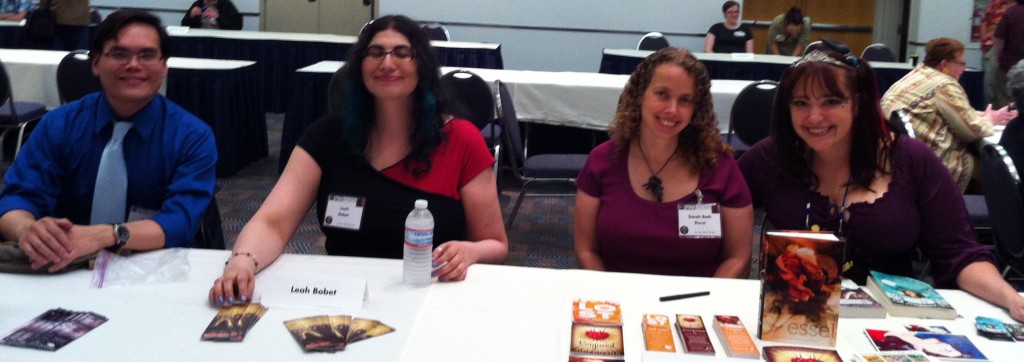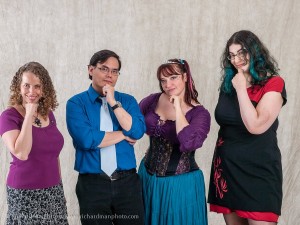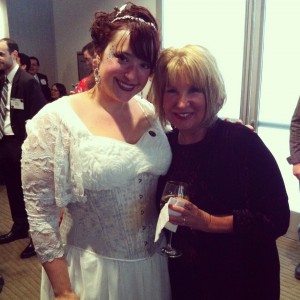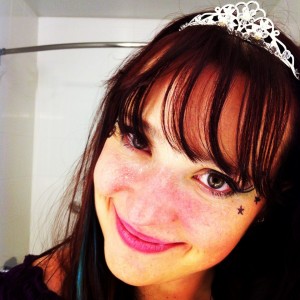Two weeks ago, I lost a very important award.
How important, you ask? Important enough that I had an essay posted about it on USA Today’s Happy Ever After blog the day before the ceremony. Important enough that my nerves had me writing this open letter to my mother on my blog…and her response the next day left me sobbing in the hotel room. But that–and dinner that first night when I discovered my Auntie Jeannine had passed away–were the only times I shed a tear.
Because, you see, the SFWA Nebula Awards Weekend this year was one of the best times I’ve ever had. I can’t think of a more fun way to lose an award. So I thought I might share some tips on what to do the next time YOU happen to be up for some major, ceremony-inducing monolith of Lucite.
Tip !: The Other Nominees Are Not The Enemy.
This year, the Andre Norton Ballot had an unprecedented TWELVE nominees. My odds weren’t good from the get-go. The day that the list was announced, I was so giddy that I instantly friended all of the nominees on Twitter and Facebook. I shared many pictures of our books and encouraged folks to spread the word of the Award to stores and libraries. I even gave our posse a name: Andre’s Dozen.
There was no way we were all going to be present for the ceremony in San Jose–Libba Bray, for one, had just landed in Australia for her book tour. Those of us who did show up: Eugene Myers, Leah Bobet, Sarah Beth Durst and me…well, we bonded.
We had a great time at the mass signing (where we smiled at everyone who walked in the door and stared at Gene Wolfe’s never-ending line), and then later, goofing off at the official Nominee Photo Shoot. We received our certificates and our pins (Sarah has THREE now) and we acted like fools. But inside we were all scared. We knew that in 24 hours, three of us would be losers. Or all of us would be. And being there, in the trenches together, was a special thing.
2.) Write Your Acceptance Speech
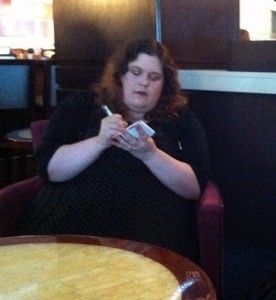 Whenever you are nominated for an award like this, you must write an acceptance speech. Even if you don’t plan on winning. You can write it well ahead of time, or you can steal a notepad from the hotel right before the banquet and scratch something brilliant down real quick…like Rachel Swirsky did when she took home a Nebula back in 2011.
Whenever you are nominated for an award like this, you must write an acceptance speech. Even if you don’t plan on winning. You can write it well ahead of time, or you can steal a notepad from the hotel right before the banquet and scratch something brilliant down real quick…like Rachel Swirsky did when she took home a Nebula back in 2011.
I wrote my speech the night that voting ended. By then my fate was sealed, for better or worse, and I could spend the next six weeks working on my “It’s an honor to be nominated” face and slow golf clap for a winner I’d inevitably despise.
That didn’t stop me from being superstitious, of course — I am Greek, after all. I hand wrote the speech on a card and slipped it into my talisman — a book I had purchased from Miss Andre’s personal collection the last time I ever saw her.
3.) Embrace The Forethought of Doom
My dear friend Gail Vinett once passed to me a bit of wisdom that I always misremember as “No forethought of doom.” Essentially: Don’t waste time on worry. But there does need to be a moment before that awards ceremony–a few days before, or a few minutes–where you know FOR ABSOLUTE CERTAIN that you are not going to walk away with this one. No matter what happens, you’re either going to be right or pleasantly surprised…but you need to know in your heart that it is never going to happen. And you need to accept that.
…which should really be a universal rule, no matter what. Nebula Awards Weekend was an amazing, magical time. I got to hobnob with the starsof SF–my heroes–and have conversations I’d never thought I’d have–like talking to Kim Stanley Robinson about how he used to sign Red Mars and Blue Mars and Green Mars with different colored pens…or how Gregory Benford believes he’s become the spitting image of Ernest Hemmingway. I finally met William C. Dietz for the first time, even though we’ve known each other for years.
And I wore a ridiculous white ballgown with a silver corset and left glitter everywhere and was the talk of the evening. Well…one of them.
I discovered, right before dinner was served, that our table was situated directly in front of the u-stream camera, and that every bite of my fish was being live cast on the internet for the world–including my parents and old high school friends up way past their bedtime on the East Coast–to see. But instead of freaking out that I had just put half a lemon into my mouth instead of a yellow squash, I decided to become U-Stream Ambassador. I dragged one SF writer after another in front of that camera to wave hello to the folks at home…because they were suddenly part of my Evening to Remember as well. And they were sharing from on every corner of the Internet.
I was so high on life that when Steven Gould walked on stage to present the Norton Award, I wasn’t *too* scared (but it was nice to have Fran Friel’s hand to hold anyway). And when Eugene’s name was called…well, I jumped up and hooted and hollered just like my brother was about to walk onto that stage. I wasn’t sad AT ALL…I was incredibly proud! There would be plenty of time to be sad later. And then later I just kind of forgot.
5.) Condolences
It would have been nice to win the Norton, sure. But it’s really been rather quite a lovely award to lose. All those people rooting for me, sitting on the edge of their seat from the other side of the table or the other side of the world, they don’t suddenly stop loving me or my work. It was like living in my very own Disney movie–nobody walks away disappointed with the Jamaican Bobsled Team. Those folks who have always cared about me, and the new friends I’d just met: They’ll all be rooting for me next time, maybe even harder.
I looked around that banquet hall and realized that there were people present–heroes of literature I looked up to–who had lost more awards than I’d ever be nominated for in my life. I suddenly felt like I belonged to an exclusive club, like I was finally on my way to becoming a Name to Remember in SF. I’ll be nominated for more awards–win some, lose some–and my friends will be nominated. We’ll present awards to each other and take turns playing master of ceremonies…and maybe half a century from now we’ll be drawing straws deciding who gets to be Grandmaster this time around.
And maybe then…well, I have a feeling I’ll remember this weekend and wish I could go back to this–the beginning–and do it all over again. So I’m going to enjoy it while I’m here, with one glass slipper in the open door.
And you know what? It was an honor to be nominated.
xox
[Enchanted was just released in paperback this week: check it out here!]
